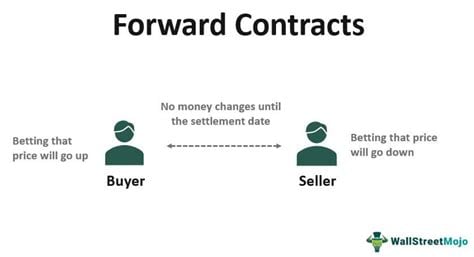
-
Forward Contract in Forex: The Ultimate Guide
- Introduction
- Section 1: Understanding Forward Contracts
- What is a Forward Contract?
- Applications of Forward Contracts
- Section 2: Mechanics of Forward Contracts
- Determining Forward Rates
- Settlement of Forward Contracts
- Section 3: Advantages and Limitations
- Advantages of Forward Contracts
- Limitations of Forward Contracts
- Table: Forward Contract Key Terms
- Conclusion
-
FAQ about Forward Contract in Forex
- What is a forward contract in forex?
- How is a forward contract different from a spot contract?
- What are the advantages of using forward contracts?
- What are the disadvantages of using forward contracts?
- How is the forward price determined?
- Who can use forward contracts?
- What are the main types of forward contracts?
- What are the risks associated with forward contracts?
- How can I trade forward contracts?
- What are the regulations governing forward contracts?
Forward Contract in Forex: The Ultimate Guide

Introduction
Hey there, readers! Welcome to the comprehensive guide on forward contracts in the forex market. In this article, we’ll dive deep into the world of forward contracts, exploring their ins and outs, advantages, and implications. So, sit back, relax, and get ready to master the complexities of forward contracts in forex!
Section 1: Understanding Forward Contracts
What is a Forward Contract?
In the realm of forex trading, a forward contract is a legally binding agreement between two parties to exchange a specific amount of currency at a predetermined exchange rate on a future date. Unlike spot transactions, which are settled immediately, forward contracts offer flexibility in the timing of currency exchange, allowing traders to mitigate risk and speculate on future price movements.
Applications of Forward Contracts
Forward contracts serve a multitude of purposes in the forex market, including:
- Hedging: Traders can use forward contracts to manage exposure to currency fluctuations, protecting themselves against potential losses in value.
- Speculation: Forward contracts enable traders to speculate on future currency movements, potentially profiting from anticipated changes in exchange rates.
- Risk Management: Forward contracts provide flexibility in managing currency risk, allowing traders to lock in exchange rates in advance and avoid costly surprises.
Section 2: Mechanics of Forward Contracts
Determining Forward Rates
The forward rate, the exchange rate agreed upon for the future delivery of currency, is derived from the prevailing spot exchange rate and the anticipated interest rate differential between the two currencies involved. Interest rate expectations and market conditions significantly influence forward rates.
Settlement of Forward Contracts
Forward contracts are settled on the agreed-upon future date, with the exchange of currency occurring at the predetermined forward rate. Physical delivery of currency is not always necessary; instead, forward contracts can be settled through cash settlements, which involve the exchange of currency equivalents at the forward rate.
Section 3: Advantages and Limitations
Advantages of Forward Contracts
Forward contracts offer several advantages to traders:
- Price Stability: Forward contracts provide price certainty, allowing traders to secure a future exchange rate and avoid unfavorable fluctuations.
- Risk Mitigation: By hedging with forward contracts, traders can significantly reduce their exposure to currency risk and protect potential profits.
- Flexibility: Forward contracts offer flexibility in managing currency commitments, enabling traders to plan their future currency needs.
Limitations of Forward Contracts
While advantageous, forward contracts also have some limitations:
- Limited Liquidity: Forward contracts may have lower liquidity compared to spot transactions, especially for less commonly traded currencies.
- Counterparty Risk: Forward contracts involve counterparty risk, the possibility that one of the parties may default on their obligations.
- Time Constraints: Forward contracts lock in exchange rates for a specific future date, limiting the opportunity to capitalize on favorable price movements that may occur after the contract is executed.
Table: Forward Contract Key Terms
| Term | Definition |
|---|---|
| Forward Rate | The predetermined exchange rate for future currency exchange |
| Future Date | The date on which the forward contract is scheduled to settle |
| Spot Exchange Rate | The prevailing exchange rate at the time of the forward contract agreement |
| Forward Premium/Discount | The difference between the forward rate and the spot rate, which reflects the anticipated interest rate differential |
| Hedging | Using forward contracts to manage exposure to currency fluctuations |
| Speculation | Using forward contracts to profit from anticipated currency movements |
Conclusion
Forward contracts play a vital role in the forex market, providing traders with flexibility, risk mitigation, and price stability. Understanding the nuances of forward contracts is essential for successful foreign exchange trading. If you’re interested in delving deeper into this fascinating topic, consider checking out our other articles on forex trading strategies and risk management techniques.
FAQ about Forward Contract in Forex
What is a forward contract in forex?
A forward contract is a customized agreement between two parties to exchange a specific amount of currency at a predetermined exchange rate on a future date.
How is a forward contract different from a spot contract?
A spot contract involves the immediate exchange of currencies at the current market rate, while a forward contract is used to lock in an exchange rate for a future date.
What are the advantages of using forward contracts?
Forward contracts allow businesses and individuals to manage their foreign currency risk by locking in exchange rates and mitigating potential losses.
What are the disadvantages of using forward contracts?
Forward contracts can limit flexibility if market conditions change, and they may involve fees or commissions.
How is the forward price determined?
The forward price is calculated based on the current spot price, the interest rate differential between the two currencies, and the time to maturity.
Who can use forward contracts?
Forward contracts are primarily used by businesses and institutional investors who engage in international trade or have exposure to foreign currencies.
What are the main types of forward contracts?
Common types of forward contracts include deliverable forwards, non-deliverable forwards, and futures contracts.
What are the risks associated with forward contracts?
Forward contracts carry risks such as exchange rate fluctuations, counterparty default, and market volatility.
How can I trade forward contracts?
Forward contracts can be traded over-the-counter (OTC) or through exchanges.
What are the regulations governing forward contracts?
Forward contracts are regulated by various financial authorities, including the International Swaps and Derivatives Association (ISDA).


